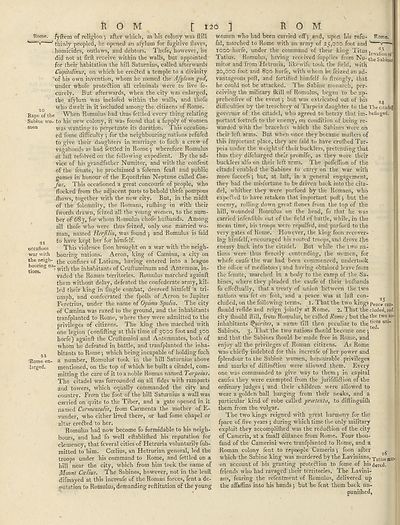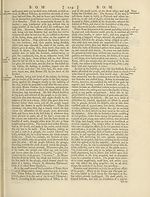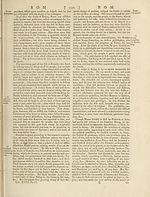Encyclopaedia Britannica, or, a Dictionary of arts, sciences, and miscellaneous literature : enlarged and improved. Illustrated with nearly six hundred engravings > Volume 18, RHI-SCR
(128) Page 120
Download files
Complete book:
Individual page:
Thumbnail gallery: Grid view | List view

T?omp.
ROM [ 120 ] R O
fyftem of religion •, after which, as his colony was ftill women who had been carried off
M
'-—Y——' thinly peopled, he opened an afylum for fugitive Haves,
homicides, outlaws, and debtors. Thefe, however, he
did not at firft receive within the walls, but appointed
for their habitation the hill Saturnius, called afterwards
Capilo/inus, on which he erefted a temple to a divinity
of his own invention, whom he named the Afylean god,
under whofe protection all criminals were to live fe-
curely. But afterwards, when the city w'as enlarged,
the afylum was inclofed within the walls, and thofe
„0 who dwelt in it included among the citizens of Rome.
Rape of the When Romulus had thus fettled every thing relating
Sabine wo- to his new colony, it was found that a fupply of women
men ^vas wanting to perpetuate its duration. This occafion-
ed fome difficulty ; for the neighbouring nations refufed
to give their daughters in marriage to fuch a crew of
vagabonds as had fettled in Rome ; wherefore Romulus
at laft refolved on the following expedient. By the ad¬
vice of his grandfather Numitor, and with the confent
of the fenate, he proclaimed a folemn feaft and public
games in honour of the Equeltrian Neptune called Con-
Jus. This occafioned a great concourfe of people, who
flocked from the adjacent parts to behold thefe pompous
Ihow's, together with the new city. But, in the midft
of the folemnity, the Romans, rufliing in with their
fwords drawn, feized all the young women, to the num¬
ber of 6S3, for whom Romulus chofe hufbands. Among
all thofe who were thus feized, only one married wo¬
man, named HcrJUia, was found } and Romulus is faid
to have kept her for himfelf.
This violence foon brought on a war with the neigh¬
bouring nations. Acron, king of Caenina, a city on
the confines of Latium, having entered into a league
Rons1"5 na" with the inhabitants of Cruftuminum and Antemnse, in¬
vaded the Roman territories. Romulus marched againfi:
them without delay, defeated the confederate army, kil¬
led their king in Angle combat, decreed himfelf a tri¬
umph, and confecrated the fpoils of Acron to Jupiter
Feretrius, under the name of Opima Spoha. The city
of Caenina was razed to the ground, and the inhabitants
tranfplanted to Rome, where they were admitted to the
privileges of citizens. The king then marched with
one legion (confiding at this time of 3000 foot and 300
horfe) againft the Cruftumini and Antemnates, both of
whom he defeated in battle, and tranfplanted the inha¬
bitants to Rome-, which being incapable of holding fuch
a number, RomuluS took in the hill Saturnius above
mentioned, on the top of which he built a citadel, com¬
mitting the care of it to a noble Roman named Tarpeius.
The citadel was furrounded on all fides with ramparts
and towers, which equally commanded the city and
country. From the foot of the hill Saturnius a wall was
carried on quite to the Tiber, and a gate opened in it
named Cannenta/is, from Carmenta the mother of E-
vander, who either lived there, or had fome chapel or
altar erefted to her.
Romulus had now become fo formidable to his neigh¬
bours, and had fo well eftablilhed his reputation for
clemency, that feveral cities of Hetruria voluntarily fub-
mitted to him. Coelius, an Hetrurian general, led the
troops under his command to Rome, and fettled on a
hill near the city, which from him took the name of
Mount Ccelius. The Sabines, however, not in the leaft
difmayed at this increafe of the Roman forces, fent a de¬
putation to Romulus, demanding reftitution of the young
21
occafions
war with
the neigh
22
Rome en¬
larged.
and, upon his refu- Rome,
fal, marched to Rome with an army of 25,000 foot and -v—»
1000 horfe, under the command of their king Titus ^
Tatius. Romulus, having received fupplies from Nu-the'sabines
mitor and from Hetruria, likevvife took the field, with
20,000 foot and 80O horfe, with whom he feized an ad¬
vantageous poll, and fortified himfelf fo ftrongly, that
he could not be attacked. The Sabine monarch, per¬
ceiving the military fkill of Romulus, began to be ap-
prehenfive of the event; but was extricated out of his
difficulties by the treachery of Tarpeia daughter to the The citadel
governor of the citadel, who agreed to betray that im-hefieged
portant fortrefs to the enemy, on condition of being re¬
warded with the bracelets which the Sabines wore on
their left arms. But when once they became mafters of
this important place, they are faid to have cruflred Tar¬
peia under the weight of their bucklers, pretending that
thus they difeharged their promife, as they wore their
bucklers alfo on their left arms. The pofleflion of the
citadel enabled the Sabines to carry on the war with
more fuccefs; but, at lalt, in a general engagement,
they had the misfortune to be driven back into the cita¬
del, whither they wrere purfued by the Romans, who
expefled to have retaken that important poll; but the
enemy, rolling down great ftones from the top of the
hill, wounded Romulus on the head, fo that he was
carried infenfible out of the field of battle, while, in the
mean time, his troops W'ere repulfed, and purfued to the
very gates of Rome. However, the king foon recover¬
ing himfelf, encouraged his routed troops, and drove the
enemy back into the citadel. But while the two na¬
tions w'ere thus fiercely contending, the women, for
whofe caufe the war had been commenced, undertook
the office of mediators ; and having obtained leave from
the fenate, marched in a body to the camp of the Sa¬
bines, where they pleaded the caufe of their hufbands
fo effedlually, that a treaty of union between the twTo
nations was fet on foot, and a peace was at laft con¬
cluded, on the following terms. 1. That the two kings peac^cos-
fliould refide and reign jointly at Rome. 2. That the eluded, and
city ffiould ftill, from Romulus, be called Rome; but the1!16 two na-
inhabitants ^uirites, a name fill then peculiar to the unl*
Sabines. 3. That the two nations fhould become one;
and that the Sabines ffiould be made free in Rome, and
enjoy all the privileges of Roman citizens. As Rome
was chiefly indebted for this increafe of her pow'er and
fplendour to the Sabine w-omen, honourable privileges
and marks of diftindlion were allowed them. Every
one was commanded to give way to them ; in capital
caufes they were exempted from the jurifdiflion of the
ordinary judges ; and their children were allow-ed to
wear a golden ball hanging from their neeks, and a
particular kind of robe called pnetexta, to diftinguifh
them from the vulgar.
The two kings reigned with great harmony for the
fpace of five years ; during which time the only military
exploit they accompliffied was the redudlion of the city
of Cameria, at a fmall diftance from Rome. Four thou-
fand of the Camerini were tranfplanted to Rome, and a
Roman colony fent to repenple Cameria; foon after ^
which the Sabine king was murdered by the Lavinians, TatjusMuri,
on account of his granting protection to fome of his^cred.
friends who had ravaged their territories. The Lavini-
ans, fearing the refentment of Romulus, delivered up
the afiaflins into his hands; but he fent them back un-
puniffied,
ROM [ 120 ] R O
fyftem of religion •, after which, as his colony was ftill women who had been carried off
M
'-—Y——' thinly peopled, he opened an afylum for fugitive Haves,
homicides, outlaws, and debtors. Thefe, however, he
did not at firft receive within the walls, but appointed
for their habitation the hill Saturnius, called afterwards
Capilo/inus, on which he erefted a temple to a divinity
of his own invention, whom he named the Afylean god,
under whofe protection all criminals were to live fe-
curely. But afterwards, when the city w'as enlarged,
the afylum was inclofed within the walls, and thofe
„0 who dwelt in it included among the citizens of Rome.
Rape of the When Romulus had thus fettled every thing relating
Sabine wo- to his new colony, it was found that a fupply of women
men ^vas wanting to perpetuate its duration. This occafion-
ed fome difficulty ; for the neighbouring nations refufed
to give their daughters in marriage to fuch a crew of
vagabonds as had fettled in Rome ; wherefore Romulus
at laft refolved on the following expedient. By the ad¬
vice of his grandfather Numitor, and with the confent
of the fenate, he proclaimed a folemn feaft and public
games in honour of the Equeltrian Neptune called Con-
Jus. This occafioned a great concourfe of people, who
flocked from the adjacent parts to behold thefe pompous
Ihow's, together with the new city. But, in the midft
of the folemnity, the Romans, rufliing in with their
fwords drawn, feized all the young women, to the num¬
ber of 6S3, for whom Romulus chofe hufbands. Among
all thofe who were thus feized, only one married wo¬
man, named HcrJUia, was found } and Romulus is faid
to have kept her for himfelf.
This violence foon brought on a war with the neigh¬
bouring nations. Acron, king of Caenina, a city on
the confines of Latium, having entered into a league
Rons1"5 na" with the inhabitants of Cruftuminum and Antemnse, in¬
vaded the Roman territories. Romulus marched againfi:
them without delay, defeated the confederate army, kil¬
led their king in Angle combat, decreed himfelf a tri¬
umph, and confecrated the fpoils of Acron to Jupiter
Feretrius, under the name of Opima Spoha. The city
of Caenina was razed to the ground, and the inhabitants
tranfplanted to Rome, where they were admitted to the
privileges of citizens. The king then marched with
one legion (confiding at this time of 3000 foot and 300
horfe) againft the Cruftumini and Antemnates, both of
whom he defeated in battle, and tranfplanted the inha¬
bitants to Rome-, which being incapable of holding fuch
a number, RomuluS took in the hill Saturnius above
mentioned, on the top of which he built a citadel, com¬
mitting the care of it to a noble Roman named Tarpeius.
The citadel was furrounded on all fides with ramparts
and towers, which equally commanded the city and
country. From the foot of the hill Saturnius a wall was
carried on quite to the Tiber, and a gate opened in it
named Cannenta/is, from Carmenta the mother of E-
vander, who either lived there, or had fome chapel or
altar erefted to her.
Romulus had now become fo formidable to his neigh¬
bours, and had fo well eftablilhed his reputation for
clemency, that feveral cities of Hetruria voluntarily fub-
mitted to him. Coelius, an Hetrurian general, led the
troops under his command to Rome, and fettled on a
hill near the city, which from him took the name of
Mount Ccelius. The Sabines, however, not in the leaft
difmayed at this increafe of the Roman forces, fent a de¬
putation to Romulus, demanding reftitution of the young
21
occafions
war with
the neigh
22
Rome en¬
larged.
and, upon his refu- Rome,
fal, marched to Rome with an army of 25,000 foot and -v—»
1000 horfe, under the command of their king Titus ^
Tatius. Romulus, having received fupplies from Nu-the'sabines
mitor and from Hetruria, likevvife took the field, with
20,000 foot and 80O horfe, with whom he feized an ad¬
vantageous poll, and fortified himfelf fo ftrongly, that
he could not be attacked. The Sabine monarch, per¬
ceiving the military fkill of Romulus, began to be ap-
prehenfive of the event; but was extricated out of his
difficulties by the treachery of Tarpeia daughter to the The citadel
governor of the citadel, who agreed to betray that im-hefieged
portant fortrefs to the enemy, on condition of being re¬
warded with the bracelets which the Sabines wore on
their left arms. But when once they became mafters of
this important place, they are faid to have cruflred Tar¬
peia under the weight of their bucklers, pretending that
thus they difeharged their promife, as they wore their
bucklers alfo on their left arms. The pofleflion of the
citadel enabled the Sabines to carry on the war with
more fuccefs; but, at lalt, in a general engagement,
they had the misfortune to be driven back into the cita¬
del, whither they wrere purfued by the Romans, who
expefled to have retaken that important poll; but the
enemy, rolling down great ftones from the top of the
hill, wounded Romulus on the head, fo that he was
carried infenfible out of the field of battle, while, in the
mean time, his troops W'ere repulfed, and purfued to the
very gates of Rome. However, the king foon recover¬
ing himfelf, encouraged his routed troops, and drove the
enemy back into the citadel. But while the two na¬
tions w'ere thus fiercely contending, the women, for
whofe caufe the war had been commenced, undertook
the office of mediators ; and having obtained leave from
the fenate, marched in a body to the camp of the Sa¬
bines, where they pleaded the caufe of their hufbands
fo effedlually, that a treaty of union between the twTo
nations was fet on foot, and a peace was at laft con¬
cluded, on the following terms. 1. That the two kings peac^cos-
fliould refide and reign jointly at Rome. 2. That the eluded, and
city ffiould ftill, from Romulus, be called Rome; but the1!16 two na-
inhabitants ^uirites, a name fill then peculiar to the unl*
Sabines. 3. That the two nations fhould become one;
and that the Sabines ffiould be made free in Rome, and
enjoy all the privileges of Roman citizens. As Rome
was chiefly indebted for this increafe of her pow'er and
fplendour to the Sabine w-omen, honourable privileges
and marks of diftindlion were allowed them. Every
one was commanded to give way to them ; in capital
caufes they were exempted from the jurifdiflion of the
ordinary judges ; and their children were allow-ed to
wear a golden ball hanging from their neeks, and a
particular kind of robe called pnetexta, to diftinguifh
them from the vulgar.
The two kings reigned with great harmony for the
fpace of five years ; during which time the only military
exploit they accompliffied was the redudlion of the city
of Cameria, at a fmall diftance from Rome. Four thou-
fand of the Camerini were tranfplanted to Rome, and a
Roman colony fent to repenple Cameria; foon after ^
which the Sabine king was murdered by the Lavinians, TatjusMuri,
on account of his granting protection to fome of his^cred.
friends who had ravaged their territories. The Lavini-
ans, fearing the refentment of Romulus, delivered up
the afiaflins into his hands; but he fent them back un-
puniffied,
Set display mode to:
![]() Universal Viewer |
Universal Viewer | ![]() Mirador |
Large image | Transcription
Mirador |
Large image | Transcription
Images and transcriptions on this page, including medium image downloads, may be used under the Creative Commons Attribution 4.0 International Licence unless otherwise stated. ![]()
| Permanent URL | https://digital.nls.uk/193020371 |
|---|
| Attribution and copyright: |
|
|---|
| Description | Ten editions of 'Encyclopaedia Britannica', issued from 1768-1903, in 231 volumes. Originally issued in 100 weekly parts (3 volumes) between 1768 and 1771 by publishers: Colin Macfarquhar and Andrew Bell (Edinburgh); editor: William Smellie: engraver: Andrew Bell. Expanded editions in the 19th century featured more volumes and contributions from leading experts in their fields. Managed and published in Edinburgh up to the 9th edition (25 volumes, from 1875-1889); the 10th edition (1902-1903) re-issued the 9th edition, with 11 supplementary volumes. |
|---|---|
| Additional NLS resources: |
|

